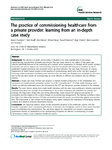The practice of commissioning healthcare from a private provider: learning from an in-depth case study
| dc.contributor.author | Chambers, N | |
| dc.contributor.author | Sheaff, Rod | |
| dc.contributor.author | Mahon, A | |
| dc.contributor.author | Byng, Richard | |
| dc.contributor.author | Mannion, R | |
| dc.contributor.author | Charles, N | |
| dc.contributor.author | Exworthy, M | |
| dc.contributor.author | Llewllyn, S | |
| dc.date.accessioned | 2017-04-02T13:52:12Z | |
| dc.date.available | 2017-04-02T13:52:12Z | |
| dc.date.issued | 2013-05-15 | |
| dc.identifier.issn | 1472-6963 | |
| dc.identifier.issn | 1472-6963 | |
| dc.identifier.other | S4 | |
| dc.identifier.uri | http://hdl.handle.net/10026.1/8749 | |
| dc.description.abstract |
Background: The direction of health service policy in England is for more diversification in the design, commissioning and provision of health care services. The case study which is the subject of this paper was selected specifically because of the partnering with a private sector organisation to manage whole system redesign of primary care and to support the commissioning of services for people with long term conditions at risk of unplanned hospital admissions and associated service provision activities. The case study forms part of a larger Department of Health funded project on the practice of commissioning which aims to find the best means of achieving a balance between monitoring and control on the one hand, and flexibility and innovation on the other, and to find out what modes of commissioning are most effective in different circumstances and for different services. Methods: A single case study method was adopted to explore multiple perspectives of the complexities and uniqueness of a public-private partnership referred to as the “Livewell project”. 10 single depth interviews were carried out with key informants across the GP practices, the PCT and the private provider involved in the initiative. Results: The main themes arising from single depth interviews with the case study participants include a particular understanding about the concept of commissioning in the context of primary care, ambitions for primary care redesign, the importance of key roles and strong relationships, issues around the adoption and spread of innovation, and the impact of the current changes to commissioning arrangements. The findings identified a close and high trust relationship between GPs (the commissioners) and the private commissioning support and provider firm. The antecedents to the contract for the project being signed indicated the importance of leveraging external contacts and influence (resource dependency theory). Conclusions: The study has surfaced issues around innovation adoption in the healthcare context. The case identifies ‘negotiated order’, managerial performance of providers and disciplinary control as three media of power used in combination by commissioners. The case lends support for stewardship and resource dependency governance theories as explanations of the underpinning conditions for effective commissioning in certain circumstances within a quasi marketised healthcare system. | |
| dc.format.extent | 1-10 | |
| dc.format.medium | Print-Electronic | |
| dc.language | English | |
| dc.language.iso | English | |
| dc.publisher | BioMed Central | |
| dc.subject | Health Care Reform | |
| dc.subject | Health Care Sector | |
| dc.subject | Health Policy | |
| dc.subject | Humans | |
| dc.subject | Public-Private Sector Partnerships | |
| dc.subject | State Medicine | |
| dc.subject | United Kingdom | |
| dc.title | The practice of commissioning healthcare from a private provider: learning from an in-depth case study | |
| dc.type | journal-article | |
| dc.type | Article | |
| plymouth.author-url | https://www.webofscience.com/api/gateway?GWVersion=2&SrcApp=PARTNER_APP&SrcAuth=LinksAMR&KeyUT=WOS:000319868600005&DestLinkType=FullRecord&DestApp=ALL_WOS&UsrCustomerID=11bb513d99f797142bcfeffcc58ea008 | |
| plymouth.issue | (Suppl 1):S4 | |
| plymouth.volume | 13 | |
| plymouth.publisher-url | http://www.biomedcentral.com/1472-6963/13/S1/S4 | |
| plymouth.publication-status | Published | |
| plymouth.journal | BMC Health Services Research | |
| dc.identifier.doi | 10.1186/1472-6963-13-s1-s4 | |
| plymouth.organisational-group | /Plymouth | |
| plymouth.organisational-group | /Plymouth/Faculty of Health | |
| plymouth.organisational-group | /Plymouth/Faculty of Health/Peninsula Medical School | |
| plymouth.organisational-group | /Plymouth/REF 2021 Researchers by UoA | |
| plymouth.organisational-group | /Plymouth/REF 2021 Researchers by UoA/UoA03 Allied Health Professions, Dentistry, Nursing and Pharmacy | |
| plymouth.organisational-group | /Plymouth/REF 2021 Researchers by UoA/UoA20 Social Work and Social Policy | |
| plymouth.organisational-group | /Plymouth/Research Groups | |
| plymouth.organisational-group | /Plymouth/Research Groups/FoH - Community and Primary Care | |
| plymouth.organisational-group | /Plymouth/Research Groups/Institute of Health and Community | |
| plymouth.organisational-group | /Plymouth/Research Groups/Institute of Translational and Stratified Medicine (ITSMED) | |
| plymouth.organisational-group | /Plymouth/Research Groups/Institute of Translational and Stratified Medicine (ITSMED)/CCT&PS | |
| plymouth.organisational-group | /Plymouth/Research Groups/Plymouth Institute of Health and Care Research (PIHR) | |
| plymouth.organisational-group | /Plymouth/Users by role | |
| plymouth.organisational-group | /Plymouth/Users by role/Academics | |
| plymouth.organisational-group | /Plymouth/Users by role/Researchers in ResearchFish submission | |
| dc.publisher.place | UK | |
| dc.identifier.eissn | 1472-6963 | |
| dc.rights.embargoperiod | No embargo | |
| rioxxterms.versionofrecord | 10.1186/1472-6963-13-s1-s4 | |
| rioxxterms.licenseref.uri | http://www.rioxx.net/licenses/all-rights-reserved | |
| rioxxterms.type | Journal Article/Review |


